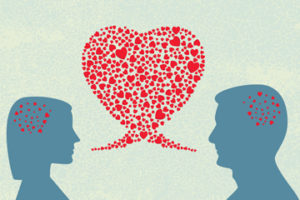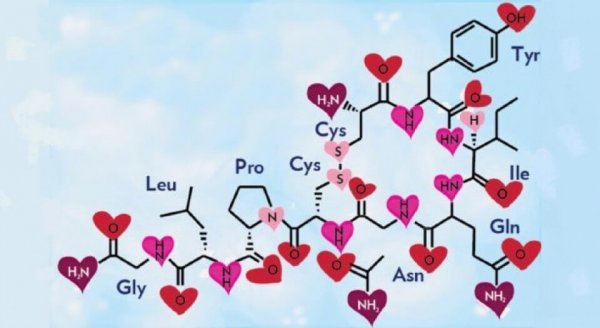I continue to explore what causes the ‘altered state’ that is created when we are caught in a romance scam. Its not only others who wonder “how could she do it?” Victims also wonder about what they have done and why, even well after they have realised they have been scammed.
I think one of the culprits is Oxytocin, the so called Love Hormone. According to Wikipedia:
Oxytocin is a peptide hormone and neuropeptide. Oxytocin is normally produced by the paraventricular nucleus of the hypothalamus and released by the posterior pituitary.
That’s way to technical for me.
But my ears pricked up recently when I was listening to the ABC’s The Science Show, and Alan Harvey was talking about the positive energy experienced by group singing. He linked this to Oxytocin. Here’s what he says about it.
All of what he suggests as positive responses to singing together can also be attributed to victim behavior during a scam. Further reading on oxytocin cites greater generosity and co-operation, heightened altruism and reduced anxiety as ‘pro-social’ behaviors linked with higher levels of oxytocin.
 I know from experience that when inside a scam, we are committed to our loved one/scammer, and will do whatever it takes to support or rescue them from the many sorts of trouble they are in. Afterwards we wonder what happened, why we didn’t see what was going on, why we rejected warnings from friends, and stepped over any inconsistencies or red flags that there were. We don’t understand what happened even when looking back on it. Perhaps because the rational part of our brain was dis-engaged at the time. Instead our brain was immersed in the fog of oxytocin. Afterwards we mostly blame ourselves for what happened and loose trust in ourselves. After all, we actively gave the money. Or did we?
I know from experience that when inside a scam, we are committed to our loved one/scammer, and will do whatever it takes to support or rescue them from the many sorts of trouble they are in. Afterwards we wonder what happened, why we didn’t see what was going on, why we rejected warnings from friends, and stepped over any inconsistencies or red flags that there were. We don’t understand what happened even when looking back on it. Perhaps because the rational part of our brain was dis-engaged at the time. Instead our brain was immersed in the fog of oxytocin. Afterwards we mostly blame ourselves for what happened and loose trust in ourselves. After all, we actively gave the money. Or did we?
What this look at the pro-social affects of oxytocin reveals is that it is likely there are deliberate goals behind the building of the romance part of the scam. In developing the love within the relationship, the ‘love hormone’ is triggered and all of the pro-social affects are engaged:
- empathy with the plight of the scammer
- enhanced trust of them when they say they will give all the money back, and will be there soon
- reduced anxiety and cooperation with what they ask us to do and what they say is the reason for things
- altruism – sacrificing ourselves financially for our loved one
- generosity, yes, we will give everything we have
- encouraging us to take risks, and not see possible dangers or implications the relationship might have. Even if it’s damaging. Even if it’s toxic. (1)
If the scammer can engage the victim in cybersex, this is even more enhanced, so some of the research says. (2) Even more oxytocin induced ‘bonding’ occurs. I know that from experience too.
As well as the grief, shame, despair and financial struggle that goes on after a scam, in the periods when we are alone with ourselves, we wonder what happened, why did we do it. It is a great mystery even to those of us who have been in it.
We need to shift out thinking to emphasise that the romance aspect is a deliberate and critical foundation to the scam, in order to generate the oxytocin that lets scammers take control of us. Once the oxytocin is generated scammers are free to use all of the pro-social effects of oxytocin to have us part with our money. Syndicates of scammers have tried and tested which words and mechanisms lead to the best results, causing us to fall in love more easily, deliberately, so they can control us.

by Adam Martinakis, 2011
Yes, perhaps part of us wanted to fall in love. But that’s separate from the manipulation of that state and the deliberate abuse of consequences by someone else. That abuse is not OK. We understand abuse of power when it is say, between a teacher and a student. This is another form of active abuse of power. Its emotional manipulation as the ultimate power game, the winner of the game taking all the money, literally.
(1) Oxytocin, the Love and Happiness Hormone December 22, 2017 in Psychology
(2) Social effects of oxytocin in humans: context and person matter
Jennifer A. Bartz1*, Jamil Zaki2*, Niall Bolger3 and Kevin N. Ochsner3
1 Mount Sinai School of Medicine, Seaver Autism Center, Department of Psychiatry, New York, New York, 10029, USA
2 Harvard University, Department of Psychology, Cambridge, Massachusetts, 02138, USA


I was recently romance scammed. The last time I spoke to him was last night, although I woke up the day after I made the payment, when a far fetched story came through via SMS giving his reason for not being able to fly out to meet me. However, there was still a part of me that thought maybe what he had told me was true because, well, anything is possible. After investigation – which is what I should’ve done thoroughly with every piece of information he gave me before I sent the money – I found out his story was as fake as far fetched. I’ve worked night and day to report him to every single scamming agency possible but I haven’t heard anything back and I feel they aren’t interested in following through because the money wasn’t a lot in comparison to what others have lost. Yet, all these cases are linked. So if I lose $3000, someone else half a million and someone else $10000, it’s usually from the same source or syndicate. So every lead is worth investigating. But if these scammers know they’ll get away with it, where’s the incentive for them to stop? I didn’t lose much but it was enough. I fit the profile of those vulnerable to scammers perfectly. I feel like a construct, an automaton and a cliche. What’s more I was naive. I never use dating apps and have felt too vulnerable to date people I don’t know. The thing is I didn’t think the scammer and I were combatable, never believed anyone was that romantic, and resisted all the way. Yet I gave in. I gave in because we started communicating 3 days before my step brother’s funeral. I began to enjoy the escape, the fun, the entertainment of it from the pain of the loss and loneliness after my step brother had died, and I thought if he met me he’d see we weren’t compatable. I also felt af sorry for him and when I realised what had happened I wanted to help him change his evil ways. At least I made him sign a hand written statement saying he’d pay the money back in full, with all the details of the account I’d paid into and dates I’d paid money to him before I made the second payment. Of course it wasn’t into his account but of some woman he’s probably scamming. The people who’ve been the most supportive have been the banks. They were so understanding and supportive, and put it into perspective. They told me there was so much of it. I still feel so ashamed. These last 10 years I’ve had such a trying time – I’ve been bullied relentlessly at work, I was assaulted at work 6 months ago, I lost my closest friend and confidante, and now this. I feel if I tell anyone they’ll not only be incredulous, but they’ll be glad. But I keep fighting in between times of just wanting to give up. Just wanting to never be seen again. Sometimes I wish I’d never had to come back to this country that gave me abuse when I was growing up and abuse since I’ve been back. I feel bitter and angry and feel I must ask for it or deserve it because of the life choices I’ve made. I feel so cynical it’s turning me into bitter lemon, and I keep asking myself, why me? Why am I so stupid when other far more selfish women I know never have these problems.
Hi Michelle, you are correct that the police do not seem to be doing anything – but I don’t think it is about the amount of money. I just think they don’t want to deal with the often intra-country jurisdiction issues.
Also, you have not been stupid, you have been manipulated emotionally by people who are extremely skilled at lying in order to get money. They have no compunction, and yes, there is no disincentive through police action. The fact that you knew, but did it anyway just shows how skilled the emotional manipulation is. And it is not personal! They target anyone they can, however, they can, in order to get money.
My name is Ruth. It has been just over 2 years since I was scammed. I am still wary of relationships and find it impossible to trust and commit again. I am still feeling the effects financially as I am an aged pensioner. I still find it hard to talk about it as people judge you and I am hurt every time someone says ” how could you just give that money to someone you never met…” Or call me stupid! I suppose I will never really get over the pain it caused me financially and emotionally but it won’t stop me trying to warn other women and men about scammers and the damage they can do. I still beat myself up but I try to love myself through the anger and pain. Jan has been a true rock supporting others , allowing them to talk without judgement and keeping us up to date . Thank you Jan , you are so brave.
Thanks Ruth, its great to have some acknowledgement for what I do. It is hard, but keep loving yourself. You have done nothing wrong.